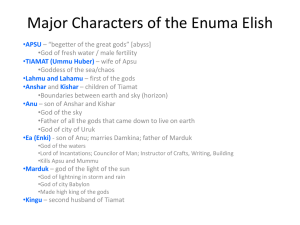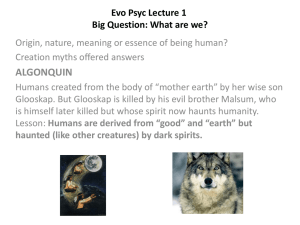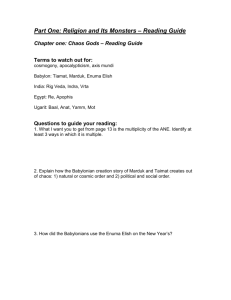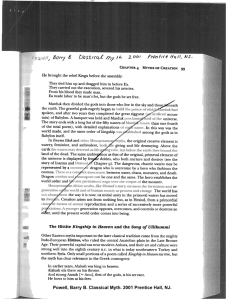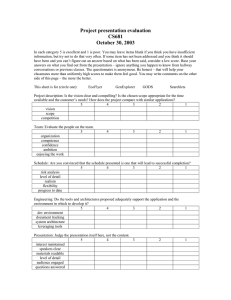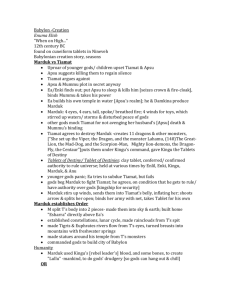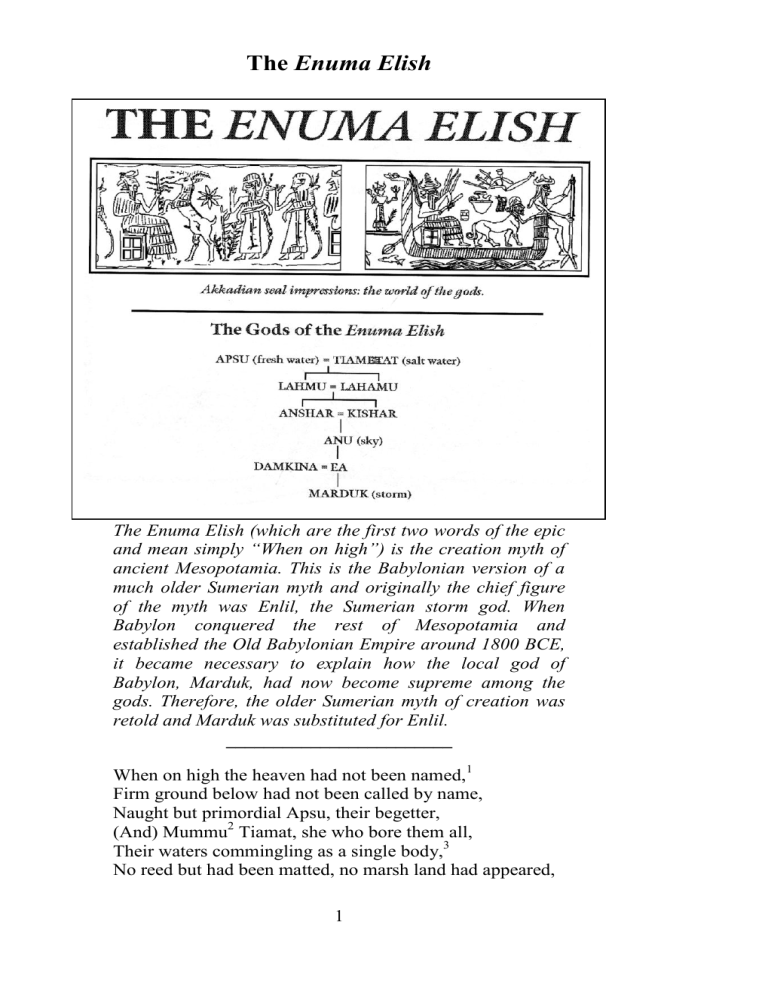
The Enuma Elish The Enuma Elish (which are the first two words of the epic and mean simply “When on high”) is the creation myth of ancient Mesopotamia. This is the Babylonian version of a much older Sumerian myth and originally the chief figure of the myth was Enlil, the Sumerian storm god. When Babylon conquered the rest of Mesopotamia and established the Old Babylonian Empire around 1800 BCE, it became necessary to explain how the local god of Babylon, Marduk, had now become supreme among the gods. Therefore, the older Sumerian myth of creation was retold and Marduk was substituted for Enlil. ________________________ When on high the heaven had not been named,1 Firm ground below had not been called by name, Naught but primordial Apsu, their begetter, (And) Mummu2 Tiamat, she who bore them all, Their waters commingling as a single body,3 No reed but had been matted, no marsh land had appeared, 1 The Enuma Elish When no gods whatever had been brought into being, Un-named, their destinies yet undermined— Then it was that the gods were emerged from within them. Lahmu and Lahamu were came forth, were called by name, Before they had grown in age and statue. Anshar and Kishar were shaped, more mighty than the others. They extended the days, added on the years. Anu was their heir, rival of his father; Verily, Anu, Anshar’s first-born, was his equal. Anu sired his image Nudimmud.4 This Nudimmud was the master of his father,5 Of broad wisdom, understanding, mighty in strength, Mightier by far than his grandfather, Anshar. He had no rival among the gods, his brothers. The divine brothers6 banded together, They disturbed Tiamat as they rushed here and there, Indeed, they distraught and tormented Tiamat By their boisterous mirth in the dwelling of Heaven. Apsu could not diminish their clamor And Tiamat was dumbfounded at their ways. Their doings were loathsome to him. Offensive and overbearing were their ways. Then Apsu, the begetter of great gods, Cried out, addressing Mummu, his vizier: “0 Mummu, my vizier, who rejoices my spirit, Come hither and let us go to Tiamat!” They went and sat down before Tiamat, Exchanging counsel about the gods, their offspring. Apsu, opening his mouth, Said unto radiant Tiamat: “Their ways are truly abominable unto me. By day I find no relief, nor repose by night. I will destroy, I will wreck their ways, That quite may be restored. Let us have rest!” As soon as Tiamat heard this, She was troubled and called out to her husband. She cried out, as she raged all alone, Injecting woe into her mood: “What? Should we destroy that which we have produced? 2 The Enuma Elish Their ways indeed are most troublesome, but let us practice kindness!” Then answered Mummu, giving counsel to Apsu; Rude and ungracious was Mummu’s advice “Destroy, my father, their rebellious ways. Then shall you have relief by day and rest by night!” When Apsu heard this, his face grew luminous Because of the evil he planned against his godly sons. He embraced Mummu by the neck As he sat down on his knees to kiss him. Now whatever they had plotted between them, Was repeated unto the gods, their first-born. When the gods heard this, they were astonished, Then lapsed into silence and remained speechless. Superior in wisdom, accomplished and resourceful, Ea, the all-wise, saw through their design. Made artful his spell against it, surpassing and holy. He recited it and made it subsist in the deep, As he poured sleep upon him. Sound asleep he lay. When he had made Apsu lie prone, deep in sleep, Mummu, the advisor, was powerless to stir. He7 loosened Apsu’s band, tore off his tiara, Removed his halo and put it on himself. Having constrained Apsu, he slew him. Mummu he bound and locked. Having thus upon Apsu established his ascendance, He laid hold of Mummu, holding him by the nose-rope. After Ea had vanquished and tramped down his foes, Had assured his triumph over his enemies, In profound peace he rested in his sacred chamber, He named it “Apsu,” for shrines he assigned it. He founded his cult in that same place. Ea and Damkina, his wife, dwelled there in splendor. In the chamber of fates, the house of destinies, A god was engendered, most able and wisest of gods. In the heart of holy Apsu was Marduk created. He who begot him was Ea, his father. 3 The Enuma Elish ________________________ Now Tiamat renewed the conflict and created an army ofmonsters. This time even the great Ea could not withstand the attack and the gods decided to ask the young Marduk to defend them against Tiamat. ________________________ Lord Anshar, father of the gods, rose up in grandeur, And having pondered in his heart, he said to the Anunnaki:8 “He whose strength is potent shall be our avenger, He who is sharp in battle, Marduk, the hero!” Ea called Marduk into his secluded presence. Giving counsel, he told him what was in his heart. ________________________ Marduk came forth, the wisest of the gods, your son, His heart prompted him to face Tiamat. He opened his mouth, saying to me “If indeed as your avenger, I am to vanquish Tiamat and save your lives, Convene the assembly and proclaim supreme my destiny! When jointly in Ubshukinna9 you sat down rejoicing, Let my word, instead of yours, determine the fates. What I may bring into being shall be unchangeable; Neither dismissed nor replaced shall be the command of my lips!” Now hasten hither and promptly fix for him your decrees, That he may go forth to face your mighty foe! ________________________ They erected for him a ample throne. Facing his fathers, he sat down, presiding. “You are the most honored of the great gods, Your decree is unrivaled, your command is Anu10 You, Marduk are the most honored of the great gods, Your decree is unrivaled, your word is Anu. From this day unchangeable shall be your pronouncement. To raise or bring low—these shall be in your hand. Your utterance shall be true, your command shall be unimpeachable. No one among the gods shall transgress your bounds! 4 The Enuma Elish Adornment being wanted for the seats of the gods, Let the place of their shrines ever be in your place. O Marduk, you are indeed our avenger. We have granted you kingship over the entire universe. Your word shall be supreme when you sit in assembly. Your weapons shall not fail; they shall smash your foes! O lord, spare the life of him who trusts you, But pour out the life11 of the god who seized evil.” Having placed in their midst a piece of cloth, They addressed themselves to Marduk, their first-born “Lord, truly your decree is first among gods. Say but to wreck or create; it shall be. Open your mouth; the cloth will vanish! Speak again, and the cloth shall be whole!” At the word emerged from his mouth the cloth vanished. He spoke again, his fathers, saw the outcome of his word, When the gods, his fathers, saw the outcome of his word, Joyfully they paid homage: “Marduk is king!” They conferred on him scepter, throne, and vestment; They gave him unequaled weapons that ward off the foes: “Go and terminate the life of Tiamat. May the winds bear her blood to places undisclosed.” Marduk’s destiny thus fixed, the gods, his fathers, Caused him to go the way of success and achievement. He constructed a bow, marked it as his weapon, Attached thereto the arrow, grasped it in his right hand; He raised the mace, grasped it in his right hand; He hung bow and quiver at his side. In front of him he sat the lightening, He filled his body with blazing flame. He then made a net to enfold Tiamat, He stationed the four winds that nothing of her might escape, The South Wind, the North Wind, the East Wind, the West Wind. Close to his side he held the net, the gift of his father, Anu. He brought forth Imhullu “the Evil Wind,” the Whirlwind, the Hurricane, The Fourfold Wind, the Sevenfold Wind, the Cyclone, the Matchless Wind; Then he sent forth the seven winds he had brought forth. 5 The Enuma Elish To sir up the inside of Tiamat they rose up behind him. Then the lord raised up the flood-storm, his mighty weapon. He mounted the storm-chariot irresistible and terrifying. He harnessed and yoked to it a team-of-four, The Killer, the Relentless, the Trampler, the Swift. Sharp were their poison bearing teeth. They were versed in ravage, skilled in destruction. On his right he posted the Smiter, fearsome in battle, On the left the Combat, which repels all the zealous. His cloak was an armor of terror, His head was turbaned with his fearsome halo. The lord went forth and followed his course, He set his face Towards the raging Tiamat. He held a spell between his lips; A plant to put out poison was grasped in his hand. Then they milled about him, the gods milled about him, The gods, his fathers, milled about him, the gods milled about him. The lord approached to scan the inside of Tiamat, (And) of Kingu, her consort, the scheme to perceive. As Marduk looks on, Kingu’s course becomes upset, His will is distracted and his maneuvers are confused. And when the gods, his helpers, who marched at his side, Saw the valiant hero, blurred became their vision. Without turning her neck, Tiamat emitted a cry, Molding savage defiance in her lips: “Too important are you for the lord of the gods to rise up against you! Is it in their place that they have gathered, or in your place?” Thereupon the lord raised his mighty weapon, the flood storm, And to enraged Tiamat he spoke the following words: “Why have you risen, why have you arrogantly exalted? You have charged your own heart to stir up conflict, [. . .]12 sons reject their own fathers, While you, who have born them, has foresworn love! You have appointed Kingu as your consort, Conferring upon him the rank of Anu, not rightfully his, Against Anshar, king of the gods, you seek evil; 6 The Enuma Elish Against the gods, my fathers, you have confirmed your wickedness. Though you have drawn up your forces, readied your weapons, Stand alone, that I and you may meet in single combat!” When Tiamat head this, She was like one possessed; she took leave of her senses. In fury Tiamat cried out aloud. To the roots of her legs shook both together. She recites a charm, keeps casting her spell, While the gods of battle sharpen their weapons. Tiamat and Mardulc, wisest of gods then joined battle, They strove in single combat, locked in conflict. The lord spread out his net to enfold her, He let loose in her face The Evil Wind, which followed behind. When Tiamat opened her mouth to consume him, He drove in the Evil Wind and she could not dose her lips. As the fierce winds encumbered her belly, Her body was distended and her mouth was wide open. He released an arrow, it tore her belly, It cut through her insides, splitting her heart. Having subdued her, he blotted out her life. He threw down her carcass and stood upon it. After he had slain Tiamat, the leader, Her band was shattered, her troupe broken up;13 And her helpers, the gods who marched at her side, Trembled with terror and turned their backs, In order to save and preserve their lives. Encirded tightly, they could not escape. He made them captives and he smashed their weapons. They found themselves ensnared in the net; Thrown into cells, they were filled with wailing; Bearing his wrath, they were held imprisoned. And the eleven creatures which she had charged with awe, The band of demons that marched before her, He cast into fetters, their hands [. . .]. For all their resistance, he trampled them underfoot. And Kingu, who had been made chief among them, He bound and accounted him to Uggae.14 He took from him the Tables of Fate, not rightfully his, 7 The Enuma Elish Sealed them with a seal and fastened them on his own breast. When he had vanquished and subdued his adversaries, Had [. . .] the vainglorious foe, Had wholly established Anshar’s triumph over the foe, Nudimmud’s desire had achieved, valiant Marduk Strengthened his hold on the vanquished gods, And turned back to Tiamat whom he had bound. The lord trampled on the legs of Tiamat, With his unsparing mace he crushed her skull. When the arteries of her blood he had severed, The North Wind bore it to places undisclosed. On seeing this, his fathers were joyful and jubilant, They brought gifts of homage to him. Then the lord paused to view her dead body, That he might divide the monster and do artful works. He split her like a shellfish into two parts: Half of her he sat up as the ceiling of the sky, He pulled down the bar and posted guards. He ordered them not to allow her waters to escape. He crossed the heavens and surveyed the regions. He squared Apsu’s quarter, the abode of Nudimmud, As the lord measured the dimensions of Apsu. The Great Abode, its likeness, he fixed as Esharra,15 The Great Abode, Esharra, which he made the firmament. Anu, Enlil, and Ea he made occupy their places. He constructed stations for the gods, Aligning their astral likenesses as constellations. He determined the year by assigning the zones: He set up three constellations for each of the twelve months. After defining the days of the years by means of astrological figures, He founded the station of Nebiru16 to determine their divine bands, That none might transgress or fall short. Alongside it he set up the stations of Enlil and Ea. Having opened up the gates on both sides,17 He strengthened the locks to the left and the right. In her belly he established the zenith. The moon he caused to shine, the night to him entrusting. 8 The Enuma Elish He appointed him a creature of the night to signify the days: “Monthly, without cease, from designs with a crown. At the month’s very start, rising over the land, You shall have luminous horns to signify six days, On the seventh day reaching a half-crown. At full moon stand in opposition in mid-month. When the sun overtakes you at the base of heaven, Diminish your crown and retrogress in light. At the time of disappearance approach you the course of the sun, And on the twenty-ninth you again stand in opposition to the sun.” ________________________ “It was Kingu who contrived the uprising, And caused Tiamat to rebel, and join battle” They bound him, holding him before Ea. They imposed on him his guilt and severed his blood vessels. Out of his blood they fashioned humankind. He18 imposed upon it the service and let free the gods. After Ea, the wise, had created humankind, Had imposed upon it the service of the gods— That toil was beyond human comprehension; As artfully planned by Marduk, did Nudimmud create itMarduk, the king of the gods divided All the Anunnaki19 above and below. He assigned them to Anu to guard his instructions. Three hundred in the heavens he stationed as a guard. ________________________ 1. I.e., had not been created. The ancients believed that naming a thing was, in itself, an act of creation. 2. Probably an epithet in the sense of “mother.” Not to be confused with the vizier Mummu who is mentioned later. 3. I.e. the fresh waters (Apsu) and the salt waters (Tiamat) have not been separated yet 4. Another name of Ea (=Enki), the god of the earth and water. 9 The Enuma Elish 5. This motif of the younger gods becoming more powerful than the older gods, and eventually supplanting them, is central to almost all of the mythological cycles of the Near East and the Eastern Mediterranean. It represents what may be thought of as the ultimate “generation gap.” Here this theme also symbolizes the process of creation, because the forces of nature (the gods) become more differentiated and defined. 6. I.e., the younger gods. 7. “He” refers to Ea, not Mummu. 8. A complex concept that is taken here to mean “the attendant deities.” 9. The assembly hall of the gods. 10. That is, has the authority of Anu, who was formerly the chief god. 11. This expression is taken from the shedding of blood, which was considered by the Babylonians to be the basis of life. 12. [. . .] represents a fragment of the text which has been lost 13. The following lines divide Tiamat’s forces into three categories: (1) the gods who had gone over to Tiamat, (2) the eleven kinds of monsters which Tiamat had created, and Kingu, Tiamat’s new husband and general. 14. The god of death. 15. Poetic name for the earth, which the Babylonians visualized as the dome of Apsu. 16. The planet Jupiter. 17. The gates of East and West through which the sun was believed to pass. 18. Ea. 19. Here Anunnaki refers to the underworld gods. 10
